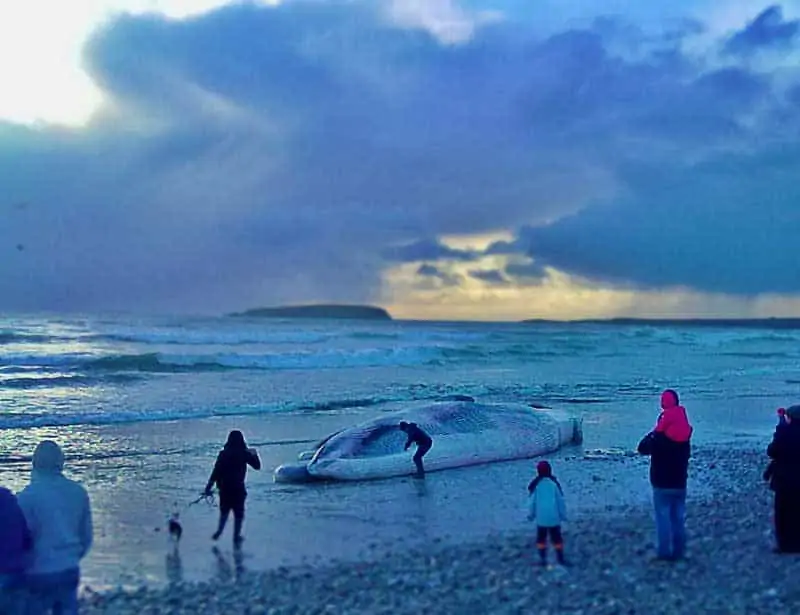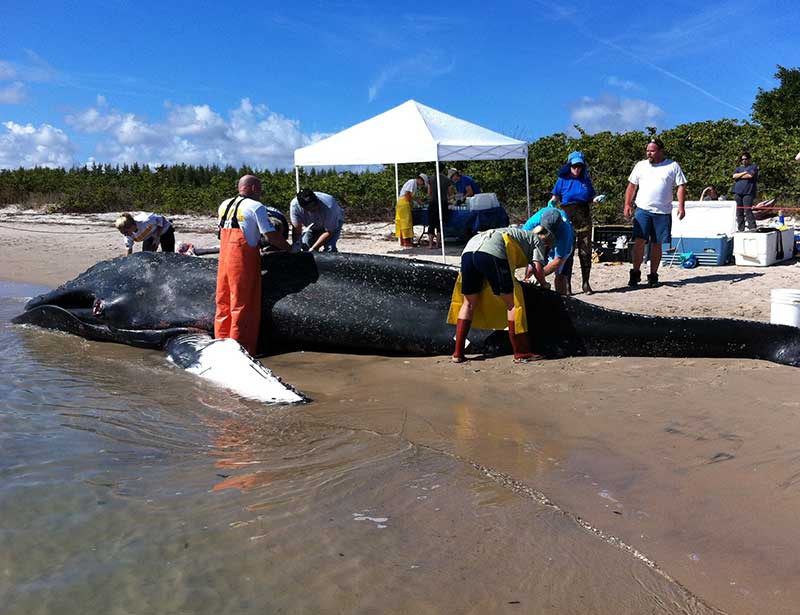Why Do Whales Beach Themselves?
Whale beaching is where a whale ends up stranded on the beach. We also call this occurrence a cetacean stranding. Whale beaching endangers their life as when these marine animals wash up on the beach, it is difficult for them to get back into the water. So, they die from dehydration or the weight of their bodies.
Types of strandings
There are two types of whale beaching. They are:
Mass strandings
Whales are generally social creatures that operate in large pods. Mass strandings happen when more than two pod members get stranded on land, often because the pod leader has a problem with their navigation skills and ends up beaching the whole pod.
Also, whales and dolphins get stranded because the pod gets infected with a particular disease. However, sonar surveys, which interfere with their navigation, are a leading cause of mass strandings.
Lone strandings
A lone whale gets stranded because of an injury or illness. In some cases, a beached whale gets separated from its family. Single strandings occur when a whale naturally dies, or in other cases, they suffocate in fishing nets. Some beached whales have net scars and injuries that point out the cause of beaching.
Why do whales beach themselves?

Whales beach themselves for many reasons, including:
- Environmental changes
- Noise pollution
- Orca’s intentional beaching
- Human activities
- Natural causes
Every year whales and other marine animals like dolphins strand themselves. It’s worth noting that whereas various theories exist as to why whales beach, no one is really certain.
For more reading, you can also check out our compilation of whale facts - highlighting some of the more fascinating aspects of these majestic marine mammals.
Environmental causes
Some environmental conditions cause whale beachings. These reasons range from water topography to climate change and pollution. Marine biologists found that climate change is one of the biggest causes of whale beaching. It affects these marine mammals by increasing the ocean's temperature levels and its acidification, a reduction in the pH levels of oceans due to the consumption of carbon dioxide.
Climate change affects some members of the whale species, like bottlenecks and pilot whales. Due to global warming, their prey migrates toward areas dangerous for pilot whales. In their feeding pursuits, the difference in tides often traps them.
Pilot whales are social animals that move together in a large pod. So, if one member of the pod gets stranded, the rest will follow suit resulting in mass strandings. The BBC reported the most recent mass stranding that occurred in March 2022 in New Zealand, where up to 31 pilot whales lost their lives. As the climate conditions worsen, the number of stranded whales will increase.
Toothed whales use their excellent sensory skills to locate food and navigate. The sounds they produce bounce off in waves, and they use them to determine the distance, direction, and surrounding texture. They also use it to navigate their way through the deep waters of the oceans.
According to Nick Davison, a stranding coordinator for the Scottish marine animal stranding scheme, some regions are too shallow for whales because their echolocation skills are better used in deep waters. Mass beaching often occurs when these marine mammals lose their sense of navigation and end up in shallow water.
Water pollution also contributes to the increased rate of beached whales. When the water gets contaminated with harmful chemical toxins and microplastics, whales can get poisoned from ingesting these toxic substances. It leads to them getting stranded on beaches and suffering from being out of the water for a long time.
Noise pollution from sonar and seismic surveys
Another reason why whales get stranded is because of noise pollution. Using sonar and seismic surveys causes disorientation in whales, leading to a loss in their sense of direction.
Sonar stands for Sound Navigation and Ranging. Active sonar uses sound to find the positions of submerged objects and the ocean floor from the echoes of emitted sound frequencies that bounces back. The military and commercial sectors use various types of active sonar devices.
Seismic surveys are a technique the petroleum industry uses to cause seismic waves beneath the ocean. Sound frequencies from the seismic surveys reach hundreds of kilometers deep in the ocean. The sonar pulses from sonar and seismic surveys disrupt whales' ability to communicate and navigate their surroundings because the pulsations frighten and block their hearing.
Sonar pulses affect beaked whales more than any other species of whales. They're defenseless against sonar in the deep waters.
Military sonar are particularly dangerous to whales. In 2000, there was a mass stranding of Cuvier and Blainville's beaked whales in the Bahamas. After investigation, the US government stated that using mid-frequency active sonar caused mass stranding2. Several other whale species that have beached are thought to have done so because of the military's sonar activities.
Sonar also affects whales by causing internal hemorrhaging. They confirmed this during the mass stranding in the Bahamas in 2000. After examination, they found that the beached whales experienced hemorrhaging around their acoustic organs.
Killer whales also experience this effect, as discovered by Ken Balcomb in his study of killer whales in the region of Juan de Fuca. He states when the sonar pulses hit a whale, it destroys the tissues in the brain and eyes. It causes the whale to be disoriented, leading to its beaching.
Orca’s intentional beaching

Orca whales are one of the species that rarely get stranded1, but they intentionally beach because they're hunting their prey. Speculations state that they have mastered how to swim excellently in shallow waters and chase seals up to the coastlines of the beach, and they wait for high tides of waves to push them back into the ocean.
Orca's intentional beaching is common in Argentina. It seems that this is a skill that gets passed down through generations.
Recently, the first killer whale stranding in the South East of the US occurred in decades in Florida.
Human activities
Some human activities cause whales to wash up on the beach. We are the major contributor to pollution to the environment.
Our fishing activities also have a significant role in getting whales stranded. We fish too much, impacting the marine food chain and leaving too little food for the whales. For their survival, they have no choice but to swim to shallow waters in search of prey. Navigating shallow waters is one of the reasons why strandings of larger whales happens.
Due to rapid industrialization, humans produce tons of environmental toxins that enter the ocean through various means. These toxins cause whales to become sick and infected with diseases. It can also interrupt their navigation, leading to mass whale strandings.
Also, there is the possibility of whales getting hit by ships on the open sea. It is a problem particular to North Atlantic right whales and other whales that are slow swimmers. They are hit by moving vessels, leading to life-threatening injuries or death. Ship collisions are one of the reasons we find beached whales.
Natural causes
Mass stranding also happens because of natural causes like diseases, injury, starvation, or loss of direction. When whales are weak, they drift until they wash up on land. Also, a female whale can wash up on the beach when in labor.
Beached whales can be injured whales that are running from their predators. Other natural causes include earthquakes, storms, volcanic eruptions, and magnetic surges.
What happens to a beached whale?

Whales stranded cannot get back into the open ocean, and staying on land is bad for them because it is not their natural habitat. By the time we find these stranded whales, there is usually little to no time left to rescue them. Beached whales die from dehydration and their body weight. Whales are giant marine mammals, and their organs collapse from the weight of their body.
Beached whales are also at risk of overheating because of their thick layer of insulating blubber. This thick layer of insulating fat helps them regulate their body temperature in water. Also, they are on their side when they wash up on the beach. It leaves them vulnerable to drowning. As high tide floats in, it covers their blowhole, causing them to drown. Furthermore, a whale beached for an extended time can explode because of the gas building up in their decaying body.
There is a low percentage of rescued whales. It is difficult to achieve because whales are massive creatures, and it takes a lot of effort to move them back into the water. Sometimes, people end a whale’s suffering by killing them. In other scenarios, rescuers spray water on the beached animal to keep it alive. They also try to keep their blowhole out of the water to avoid drowning.
In a case where the whale dies, its body is moved back into the sea because a dead whale on land has dangerous health consequences. Another way of disposing of a dead whale is to bury them on the beach. Or it could be incinerated in a landfill. Although, it is advisable to tow the body back into the ocean so it can enrich the ocean floor. Similar to the way dead animals add nutrients to the soil on land.
Conclusion
Whale beachings are yet to be thoroughly understood by scientists. However, from the available research information that we have, we know that humans and environmental vices are contributing to mass beachings.
Researchers haven't come up with a way to prevent whale beachings. Still, they believe that a reduction in sonar surveys conducted by the military could reduce avoidable beachings from human causes.
| 1 | Lopez, J. C., & Lopez, D. (1985). Killer Whales (Orcinus orca) of Patagonia, and Their Behavior of Intentional Stranding While Hunting Nearshore. Journal of Mammalogy, 66(1), 181–183. https://doi.org/10.2307/1380981 |
| 2 | Impacts of Navy Sonar on Whales and Dolphins: Now beyond a Smoking Gun? E. C. M. Parsons, Front. Mar. Sci., 13 September 2017, Sec. Ocean Solutions, https://doi.org/10.3389/fmars.2017.00295 |
Jen’s a passionate environmentalist and sustainability expert. With a science degree from Babcock University Jen loves applying her research skills to craft editorial that connects with our global changemaker and readership audiences centered around topics including zero waste, sustainability, climate change, and biodiversity.
Elsewhere Jen’s interests include the role that future technology and data have in helping us solve some of the planet’s biggest challenges.

